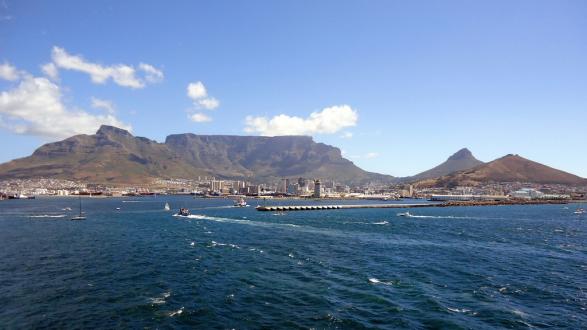In:
Global Beat is your weekly stop for news from around the world. Join us every Friday morning for important stories you should know about.
This week, an extreme drought causes Cape Town to drastically cut down on its water use; North and South Korea agree to march under a common flag in next month’s Winter Olympics; Saudi Arabia injects $2 billion into Yemen’s central bank; and more.
____________________
Americas
Venezuelan special forces conducted an early morning raid of a rebel stronghold near Caracas on Monday, killing seven and capturing several rebels. One of those killed was Oscar Perez, a former police pilot who allegedly stole a helicopter and dropped grenades on the country’s Supreme Court and fired shots at the Interior Ministry in June and has been on the run for several months. Perez, an opposition leader fighting Nicolás Maduro’s government, posted videos of himself in the hours leading up to the raid in which he said he was willing to surrender while under siege, but that he knew the police were not interested in taking him alive.
Also check out:
- Ecuador grants citizenship to Julian Assange in bid to end London embassy standoff – The Washington Post
Central & South Asia
On Thursday, India tested a new long-range intercontinental ballistic missile that has the capability to carry nuclear weapons. The range of the missile includes the potential to reach most of China, increasing tensions just a few months after the two countries officially ended their dispute over territory in the Himalayas, as well as during India’s ongoing territorial disputes with Pakistan. The only other countries that have such ICBMs are the United States, Britain, Russia, China, and France.
Also check out:
- Two polio workers, mother and daughter, killed in Pakistan – Radio Free Europe/Radio Liberty
China & East Asia
For the first time in 11 years, North and South Korea will submit a joint women’s ice hockey team that will march together under the same flag at next month’s Winter Olympics in Pyeongchang, South Korea. Critics say Kim Jong-un is trying to curry favor with South Korea in an attempt to drive a wedge in its relationship with the United States. North Korea will also send a delegation consisting of 550 people, including a 230-member cheering group, a 30-member taekwondo team, journalists, athletes, and officials, as well as a 150-member delegation that will attend the Paralympic Games in March.
Also check out:
Europe & Russia
U.K. Prime Minister Theresa May offered border security funds totaling £44.5 million to France during talks with French President Emmanuel Macron this week in an effort to show that her country still has much to offer France and other EU members as the Brexit talks drag on. The new funding will target Calais—the site of a refugee camp known as "The Jungle" that was in operation until October 2016—and other border points with fencing, CCTV, and infrared detection technology.
Also check out:
Middle East & North Africa
Saudi Arabia injected $2 billion into Yemen’s central bank this week in an effort to prop up the war-torn country’s economy. Yemen’s civil war has lasted nearly three years, with Saudi Arabia supporting the government and Iran supporting Houthi rebels. Aid agencies said the conflict has resulted in the world’s worst humanitarian disaster. Prices for basic necessities have skyrocketed, millions are in need of food and humanitarian assistance, and a major cholera outbreak has spread across the country.
Also check out:
- Warming, water crisis, then unrest: how Iran fits an alarming pattern – The New York Times
Southeast Asia & Oceania
Bangladesh plans to repatriate Rohingya Muslim refugees back to Myanmar over to two years starting next week, a timeline critics have said is way too soon. Late last year, more than 700,000 Rohingya fled from violence carried out by Myanmar’s military, which included burning villages, raping women, and killing men, in what the UN has called ethnic cleansing. Meanwhile, Rohingya continue to cross into Bangladesh from Myanmar, and the latest refugees say military operations are ongoing.
Also check out:
Sub-Saharan Africa
Cape Town, South Africa, could run out of water by April 21, officials said this week. An extreme drought has caused the city and other parts of South Africa to drastically cut down on water use. The city’s government launched a website allowing residents to see a water consumption map, which critics say violate residents’ privacy. If the city is forced to shut off water in April, it would mark the first time a major city has run out of water.
Also check out:
- Zimbabwe to hold first post-Mugabe vote this summer – Al Jazeera




